
Remember 1998? Eleven years ago, Otago could, with some justification, claim to be the premier sporting province in New Zealand.
One of the great provincial rugby teams, inspired by the power of Anton Oliver, Kees Meeuws and Carl Hoeft, the spark of Josh Kronfeld, Byron Kelleher and Brendan Laney, the reliability of Tony Brown, John Blaikie and Tony Brown, and the genius of Jeff Wilson, marched to the national championship.
It still boggles the mind that Otago scored 375 points over the final six games - averaging nearly 63 points a game - including scores of 84-10 (Northland) and 82-10 (Wellington).
But, arguably, the Otago rugby side wasn't even the best team in the province in 1998.
It was Otago netball's year of years, with the Rebels - now, tragically, sucked up by a team based in Invercargill - coasting to the first national league title, and Otago winning the national provincial championship for the first time since 1961.
Through 22 games, the Rebels and Otago were unbeaten.
And Otago would add the national under-21 title.
Rugby, which also had the Highlanders reaching the Super 14 semifinals and Otago Boys sharing the national schools title, and netball were not the only shows in town in 1998.
Fairfield became the first Otago bowls club to win the national interclub title, the Otago rugby league team beat the West Coast in Greymouth for the first time since 1927, and the Otago men's golf team was second in the national interprovincial tournament.
The Otago Nuggets finished eighth of 11 teams in the National Basketball League but they still had a reasonable following and they had finished fourth the previous year.
Finally, Dunedin Technical was the runner-up in the Chatham Cup, a competition it would win in 1999.
Some year, right? Eleven years later, the Highlanders are Super 14 also-rans, Otago rugby is struggling, the Otago Rebels do not exist, the Otago Nuggets are dead, the Otago rugby league team gets the occasional friendly game, and a new football team called Otago United is a shambles.
Exciting new faces have emerged.
Alison Shanks (cycling), Greg Henderson (cycling), Hamish Bond (rowing), Jossi Wells (freeskiing) and Nicky Samuels (triathlon) are either the best in the world, or close to it, in their respective sports.
But there has been a major change since 1998.
Otago's individuals - and I count Bond here, even though he is part of a national team - are now leading the way, while the province's teams, cricket excepted, are battling.
This begs three questions: Does the rise of individual athletes in Otago and the fall of Otago teams reflect a shift in societal trends? Are more young people choosing individual sports over team sports? Does that matter?
The answers seem to be yes, sort of and not really.
Sport Otago chief executive John Brimble believes it is clear that individual sports are much more popular than they were even 10 to 15 years ago.
"Part of that is a reflection on people's attitudes. It's a change in society, and a reflection on the pressures on people," Brimble said.
"More and more adults, and I include myself, prefer to choose sports where we can get out and do it ourselves, when it suits.
"Multisport has had phenomenal growth for that reason. Cycling's another one."
Brimble believes many people have lost interest in the formal structure of major team sports, which generally involve training on Tuesdays and Thursdays and playing on Saturdays.
"A lot of people, particularly adolescents, don't have the time or commitment for that. But what they can do is train in their own time and compete on their own."
Des Smith, a long-serving former schoolteacher and Otago rugby manager, agrees.
In his new role as director of the Otago Secondary School Sports Association, Smith gets to see first-hand the eagerness of pupils to try new individual sports.
"I think the main reason is some secondary school students would prefer to do sport in their own time, rather than have to train Tuesday and Thursday and play on Saturday," Smith said, echoing Brimble's feeling.
"I think it's fair to say that is a reflection on society. Probably some of it is driven by parents.
"There are also a lot of senior students who work in the evenings or work at weekends. So if they want to play sport, then they might have to look for something that fits in."
Another factor in the rise of individual sports is the sheer range of sports on offer.
Where "rugby in the winter, cricket in the summer" was once the staple of boys schools, for example, there is now remarkable choice.
Some of the better-resourced secondary schools in Otago offer more than 30 sports.
Kids are playing ice hockey and water polo.
They are doing orienteering, curling, trampolining and waka ama, not to mention cycling and aerobics and shooting and skiing.
Ken Hodge, an associate professor in sport and exercise psychology at the University of Otago's School of Physical Education, feels there could be a range of reasons why individual sports are starting to become more popular.
"Clearly, people have much greater exposure to a wider range of sport and leisure activities via the media," Hodge said.
"Moreover, in recent years there has been more acceptance and support to participate in non-traditional sports. It may also be that some team sports are more expensive to participate in."
Hodge wondered if non-traditional individual sports had also become more popular because young athletes perceived greater opportunities to succeed at national and international levels against fewer competitors.
"There may also be wider societal shifts with people becoming much more individual and consumer focused," Hodge said.
"People may need and seek less social interaction, something that might have been important via sport - especially team sport - in the past."
While it is clear some individual sports have boomed, Smith said there were no neat conclusions to be drawn about the changes in participation in sport at secondary-school level.
National figures from 2000 to 2008 show team sports such as cricket (down 26%) and softball (down 21%) have lost numbers, while individual sports such as cycling (up 113%) and skiing (36%) are up.
But the team sports of rugby league (up 33%) and basketball (up 6%) have boosted their numbers, while the individual sports of golf (down 33%) and swimming (down 24%) have gone backwards.
Rugby and netball remain the powerhouses of secondary sport, with 29,059 and 28,510 pupils respectively, but both recorded slight drops (5% and 4%) over the period.
Brimble believes some secondary school athletes have moved away from team sports because they feel disadvantaged or left out.
"There are plenty of cases where kids were forgotten about because they might not have been quite good enough to make a top team," he said.
"When you compete in something like athletics or multisport, you're almost competing with yourself, looking for a best time or a best distance. That offers more personal satisfaction for some people."
Of course, the shift in sporting trends is not just at the teenage level.
The explosion in masters sport indicates more interest in individual sport - and more easy access to individual sport - among older athletes.
The difficult question is whether an increased emphasis on individual sport is a good thing, a bad thing or essentially meaningless.
Many athletes play for teams and find the time to pursue individual sports, and few would disagree that any participation in physical activity, be it solitary or communal, is a good thing.
But traditionalists may argue future generations of sportspeople will miss out on the camaraderie and leadership opportunities a team sport can offer if the pendulum swings further towards individual sport.
Brimble said a lift in the profile of individual sports did not necessarily spell bad news for team sports.
"What it means is the traditional team sports have to lift their game and sharpen their approach.
They can't just rest on their laurels and assume that, because they have always been the big players, they can attract and retain players.
"The big team sports have to ask what they can offer people. And some of them need to have a good look at what they're doing."
None of this explains why Otago teams are generally struggling while the province's individual stars steal the limelight.
Possibly, it is just a coincidence. Come back in 11 years and maybe Otago's teams will be winning all the trophies.
•Otago sport
Elite athletes and teams
Individuals
- Alison Shanks (cycling) - world 3000m individual pursuit champion
- Greg Henderson (cycling) - Tour of Spain stage winner
- Hamish Bond (rowing) - world pairs champion (with Eric Murray)
- Jossi Wells (freeskiing) - X games medallist, world superpipe champion
- Nicky Samuels (triathlon) - New Zealand champion, briefly ranked No 2 in the world
- Adam Hall (skiing) - New Zealand snowsports athlete of the year
- Duncan Croudis (golf) - New Zealand under-19 champion
Teams
- Otago Volts (cricket) - two domestic titles in past two summers, qualified for inaugural Champions League in India
- Highlanders (rugby) - 11th in Super 14 past two years
- Otago (rugby) - 10th in national championship last year, won just two out of seven games this year
- Otago United (football) - won just seven out of the past 52 games
- Otago Rebels (netball) - disbanded
- Otago Nuggets (basketball) - pulled out of national league
- Southern men and women (hockey) - won just one of the past 18 games combined














